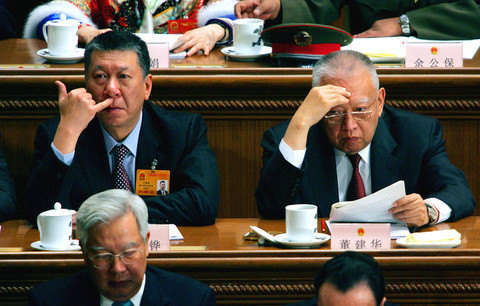Concerns about the future of Hong Kong's autonomy under Chinese rule grew yesterday following reports that Beijing may flout the territory's mini-constitution in appointing a new leader.
Hong Kong Chief Executive Tung Chee-hwa (
However, with both Tung and the government dodging questions on the reports, speculation was rife about the timing of any resignation.

PHOTO: AP
Reports yesterday suggested that Tung may put off an announcement until next weekend when he is to be elected as a vice-chairman of China's prestigious political advisory body, the Chinese People's Political Consultative Conference (CPPCC).
His resignation, with more than two years to go until the end of his term, would confirm strong rumors in circulation since Tung was nominated a week ago for the post, one usually reserved for retiring officials.
Tung, in Beijing for the annual gathering of CPPCC delegates, has said only that he would speak at "an appropriate time."
He is expected to meet Chinese Premier Wen Jiabao (
Analysts and politicians say the secrecy over such an important issue bodes ill for Hong Kong's promised "high degree of autonomy" within China's autocratic one-party state.
"China is just walking over us," said Legislator Emily Lau (劉慧卿), an outspoken critic of Tung's administration.
Hong Kong was handed back to China with the promise that it could maintain its capitalist way of life for at least 50 years and that local people would run the city under "one country, two systems."
Those promises were codified in the Basic Law, the constitution drawn up by China and Britain which came into force in 1997.
The US urged further strides towards democracy in the city, amid concern that Tung's departure would erode past reforms.
"US policy has consistently been to support the aspirations of the Hong Kong people for democracy," State Department spokesman Richard Boucher said.
"Whatever decisions are made there, we think there should be continued movement in the direction specified by the Basic Law and in the direction desired by the Hong Kong people, which is democracy," he said.
Unease was also growing over reports that China was likely to appoint a successor just to serve the remaining two years of Tung's term, even though the Basic Law stipulates the chief executive shall be appointed for a five-year stint.
Several newspapers said on Friday that Hong Kong Chief Secretary Donald Tsang (曾蔭權) would be appointed to serve the remainder of Tung's term so that China's leaders can assess whether he is the right man for the job.
If not, it may consider other candidates for the next term starting in 2007, according to the South China Morning Post.
Tung's resignation has been mooted since July 2003 when more than 500,000 people marched in protest over an unpopular anti-subversion law proposed by China. The rally sparked a political crisis from which Tung never recovered.
Critically low popularity ratings diminished the small mandate he had and a huge rally a year later amid a brewing row over the timing of democratic reforms hobbled him further.
Tung is believed to have offered his resignation twice before, only to be rebutted by a leadership keen not to cause waves in the city's political establishment.
Analysts say the new Chinese leadership that last year supplanted Tung's mentor and former president Jiang Zemin (江澤民) was less willing to tolerate Tung.

Four people jailed in the landmark Hong Kong national security trial of "47 democrats" accused of conspiracy to commit subversion were freed today after more than four years behind bars, the second group to be released in a month. Among those freed was long-time political and LGBTQ activist Jimmy Sham (岑子杰), who also led one of Hong Kong’s largest pro-democracy groups, the Civil Human Rights Front, which disbanded in 2021. "Let me spend some time with my family," Sham said after arriving at his home in the Kowloon district of Jordan. "I don’t know how to plan ahead because, to me, it feels

Polish presidential candidates offered different visions of Poland and its relations with Ukraine in a televised debate ahead of next week’s run-off, which remains on a knife-edge. During a head-to-head debate lasting two hours, centrist Warsaw Mayor Rafal Trzaskowski, from Polish Prime Minister Donald Tusk’s governing pro-European coalition, faced the Eurosceptic historian Karol Nawrocki, backed by the right-wing populist Law and Justice party (PiS). The two candidates, who qualified for the second round after coming in the top two places in the first vote on Sunday last week, clashed over Poland’s relations with Ukraine, EU policy and the track records of their

‘A THREAT’: Guyanese President Irfan Ali called on Venezuela to follow international court rulings over the region, whose border Guyana says was ratified back in 1899 Misael Zapara said he would vote in Venezuela’s first elections yesterday for the territory of Essequibo, despite living more than 100km away from the oil-rich Guyana-administered region. Both countries lay claim to Essequibo, which makes up two-thirds of Guyana’s territory and is home to 125,000 of its 800,000 citizens. Guyana has administered the region for decades. The centuries-old dispute has intensified since ExxonMobil discovered massive offshore oil deposits a decade ago, giving Guyana the largest crude oil reserves per capita in the world. Venezuela would elect a governor, eight National Assembly deputies and regional councilors in a newly created constituency for the 160,000

North Korea has detained another official over last week’s failed launch of a warship, which damaged the naval destroyer, state media reported yesterday. Pyongyang announced “a serious accident” at Wednesday last week’s launch ceremony, which crushed sections of the bottom of the new destroyer. North Korean leader Kim Jong-un called the mishap a “criminal act caused by absolute carelessness.” Ri Hyong-son, vice department director of the Munitions Industry Department of the Party Central Committee, was summoned and detained on Sunday, the Korean Central News Agency (KCNA) reported. He was “greatly responsible for the occurrence of the serious accident,” it said. Ri is the fourth person